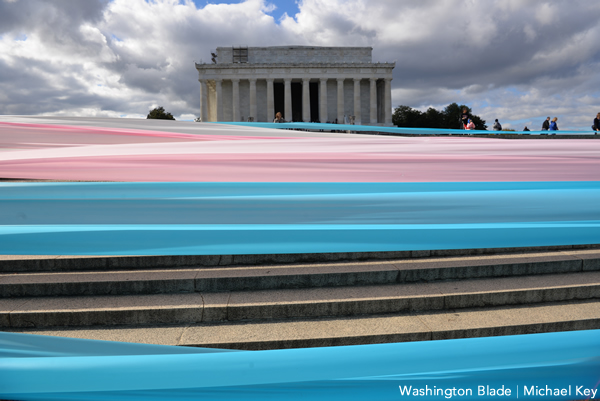News
House votes to defund trans military ban in rebuke to Trump


Rep. Chris Pappas (D-N.H.), on left, and Rep. Jackie Speier (D-Calif.), second from right, join transgender service members in the Capitol Rotunda before the State of the Union Address on Feb. 5, 2019. (Washington Blade file photo by Michael Key)
The vote on the amendment, introduced by Reps. Anthony Brown (D-Md.) and Jackie Speier (D-Calif.), was 243-183 and largely along party lines. The measure was adopted as part of $983 billion minibus legislation for fiscal year 2020 seeking to fund the Defense Department, as well as labor, health and human services, education, state-foreign operations and energy and water development.
The amendment passed with bipartisan support. Nine Republicans — Reps. Justin Amash (Mich.), Mario Diaz-Balart (Fla.), Tom Emmer (Minn.), Brian Fitzpatrick (Pa.), Anthony Gonzalez (Ohio), Trey Hollingsworth (Ind.), Will Hurd (Texas), John Katko (N.Y.) and Tom Reed (N.Y.) — voted “yes” on the measure.
However, one Democrat voted against it: Rep. Colin Peterson (Minn).
Before April, transgender people could enlist and serve openly in the military thanks to a policy change during the Obama administration. But under the new Trump administration policy, a diagnosis of gender dysphoria disqualifies potential enlistees, and a diagnosis of gender dysphoria — with the exception of transgender people already serving in the armed forces — is cause for discharge.
It’s not the first time the House has voted to rebuked the transgender military ban. In March, the chamber approved a non-binding resolution introduced by Kennedy against the Trump administration policy.
After the House approves the underlying minibus legislation, it will head to the Senate, which has yet to take up any appropriations bills for fiscal year 2020.
Any version of the spending bill with a provision against the transgender military ban would likely not fare well in the Republican-controlled chamber. (But passage isn’t impossible. Ending a filibuster on budgetary legislation requires a majority vote in the Senate, unlike the 60 votes needed to proceed with policy legislation.)
The White House has already issued a veto threat over the minibus legislation, but for reasons wholly unrelated to the transgender military ban. In a White House Office of Management & Budget Statement of Administration Policy opposes the legislation, citing concerns about raising discretionary spending caps by more than $350 billion in fiscal years 2020 and 2021 and putting the U.S. government on track to add nearly $2 trillion in deficits over 10 years.
The vote on the Brown-Speier amendment will likely not be the last word from the House on the transgender military ban. Rep. Adam Smith (D-Wash.), chair of the House Armed Services Committee, said he expects a floor vote against the policy as the part of the fiscal year 2020 defense authorization bill, which is legislation separate from the appropriations bill.
Jennifer Levi, director of the transgender rights project at GLBTQ Legal Advocates & Defenders, commanded the House in a statement for approving the amendment against the transgender ban.
“A policy that turns away qualified, dedicated Americans who want to serve their country is baseless, discriminatory, and ultimately weakens our military,” Levi said.
Shannon Minter, legal director for the National Center for Lesbian Rights, referenced in a statement on the amendment polls showing a supermajority of the American public are against the policy.
“Military leaders don’t want this ban and the American people don’t want this ban — including a growing percentage of the president’s own party,” Minter said. “We won’t stop fighting in the courts to end the ban for good and we applaud members of Congress for continuing to fight for our transgender service members as well.”

Maryland Gov. Wes Moore on Thursday signed a bill that seeks to combat efforts to ban books from state libraries.
House Bill 785, also known as the Freedom to Read Act, would establish a state policy “that local school systems operate their school library media programs consistent with certain standards; requiring each local school system to develop a policy and procedures to review objections to materials in a school library media program; prohibiting a county board of education from dismissing, demoting, suspending, disciplining, reassigning, transferring, or otherwise retaliating against certain school library media program personnel for performing their job duties consistent with certain standards.”
Moore on Thursday also signed House Bill 1386, which GLSEN notes will “develop guidelines for an anti-bias training program for school employees.”

The Mexican Senate on Thursday approved a bill that would ban so-called conversion therapy in the country.
Yaaj México, a Mexican LGBTQ rights group, on X noted the measure passed by a 77-4 vote margin with 15 abstentions. The Chamber of Deputies, the lower house of Mexico’s congress, approved the bill last month that, among other things, would subject conversion therapy practitioners to between two and six years in prison and fines.
The Senate on its X account described conversion therapy as “practices that have incentivized the violation of human rights of the LGBTTTIQ+ community.”
“The Senate moved (to) sanction therapies that impede or annul a person’s orientation or gender identity,” it said. “There are aggravating factors when the practices are done to minors, older adults and people with disabilities.”
Mexico City and the states of Oaxaca, Quintana Roo, Jalisco and Sonora are among the Mexican jurisdictions that have banned the discredited practice.
The Senate in 2022 passed a conversion therapy ban bill, but the House of Deputies did not approve it. It is not immediately clear whether President Andrés Manuel López Obrador supports the ban.
Canada, Brazil, Belgium, Germany, France, and New Zealand are among the countries that ban conversion therapy. Virginia, California, and D.C. are among the U.S. jurisdictions that prohibit the practice for minors.
The White House
Four states to ignore new Title IX rules protecting transgender students
Biden administration last Friday released final regulations

BY ERIN REED | Last Friday, the Biden administration released its final Title IX rules, which include protections for LGBTQ students by clarifying that Title IX forbids discrimination based on sexual orientation and gender identity.
The rule change could have a significant impact as it would supersede bathroom bans and other discriminatory policies that have become increasingly common in Republican states within the U.S.
As of Thursday morning, however, officials in at least four states — Oklahoma, Louisiana, Florida, and South Carolina — have directed schools to ignore the regulations, potentially setting up a federal showdown that may ultimately end up in a protracted court battle in the lead-up to the 2024 elections.
Louisiana State Superintendent of Education Cade Brumley was the first to respond, decrying the fact that the new Title IX regulations could block teachers and other students from exercising what has been dubbed by some a “right to bully” transgender students by using their old names and pronouns intentionally.
Asserting that Title IX law does not protect trans and queer students, Brumley states that schools “should not alter policies or procedures at this time.” Critically, several courts have ruled that trans and queer students are protected by Title IX, including the 4th U.S. Circuit Court of Appeals in a recent case in West Virginia.
In South Carolina, Schools Supt. Ellen Weaver wrote in a letter that providing protections for trans and LGBTQ students under Title IX “would rescind 50 years of progress and equality of opportunity by putting girls and women at a disadvantage in the educational arena,” apparently leaving trans kids out of her definition of those who deserve progress and equality of opportunity.
She then directed schools to ignore the new directive while waiting for court challenges. While South Carolina does not have a bathroom ban or statewide “Don’t Say Gay or Trans” law, such bills continue to be proposed in the state.
Responding to the South Carolina letter, Chase Glenn of Alliance For Full Acceptance stated, “While Supt. Weaver may not personally support the rights of LGBTQ+ students, she has the responsibility as the top school leader in our state to ensure that all students have equal rights and protections, and a safe place to learn and be themselves. The flagrant disregard shown for the Title IX rule tells me that our superintendent unfortunately does not have the best interests of all students in mind.”
Florida Education Commissioner Manny Diaz also joined in instructing schools not to implement Title IX regulations. In a letter issued to area schools, Diaz stated that the new Title IX regulations were tantamount to “gaslighting the country into believing that biological sex no longer has any meaning.”
Governor Ron DeSantis approved of the letter and stated that Florida “will not comply.” Florida has notably been the site of some of the most viciously anti-queer and anti-trans legislation in recent history, including a “Don’t Say Gay or Trans” law that was used to force a trans female teacher to go by “Mr.”
State Education Supt. Ryan Walters of Oklahoma was the latest to echo similar sentiments. Walters has recently appointed the right-wing media figure Chaya Raichik of Libs of TikTok to an advisory role “to improve school safety,” and notably, Raichik has posed proudly with papers accusing her of instigating bomb threats with her incendiary posts about LGBTQ people in classrooms.
The Title IX policies have been universally applauded by large LGBTQ rights organizations in the U.S. Lambda Legal, a key figure in fighting anti-LGBTQ legislation nationwide, said that the regulations “clearly cover LGBTQ+ students, as well as survivors and pregnant and parenting students across race and gender identity.” The Human Rights Campaign also praised the rule, stating, “rule will be life-changing for so many LGBTQ+ youth and help ensure LGBTQ+ students can receive the same educational experience as their peers: Going to dances, safely using the restroom, and writing stories that tell the truth about their own lives.”
The rule is slated to go into effect Aug. 1, pending any legal challenges.
****************************************************************************

Erin Reed is a transgender woman (she/her pronouns) and researcher who tracks anti-LGBTQ+ legislation around the world and helps people become better advocates for their queer family, friends, colleagues, and community. Reed also is a social media consultant and public speaker.
******************************************************************************************
The preceding article was first published at Erin In The Morning and is republished with permission.
-

 District of Columbia3 days ago
District of Columbia3 days agoCatching up with the asexuals and aromantics of D.C.
-

 State Department5 days ago
State Department5 days agoState Department releases annual human rights report
-

 South America3 days ago
South America3 days agoArgentina government dismisses transgender public sector employees
-

 Maine4 days ago
Maine4 days agoMaine governor signs transgender, abortion sanctuary bill into law










